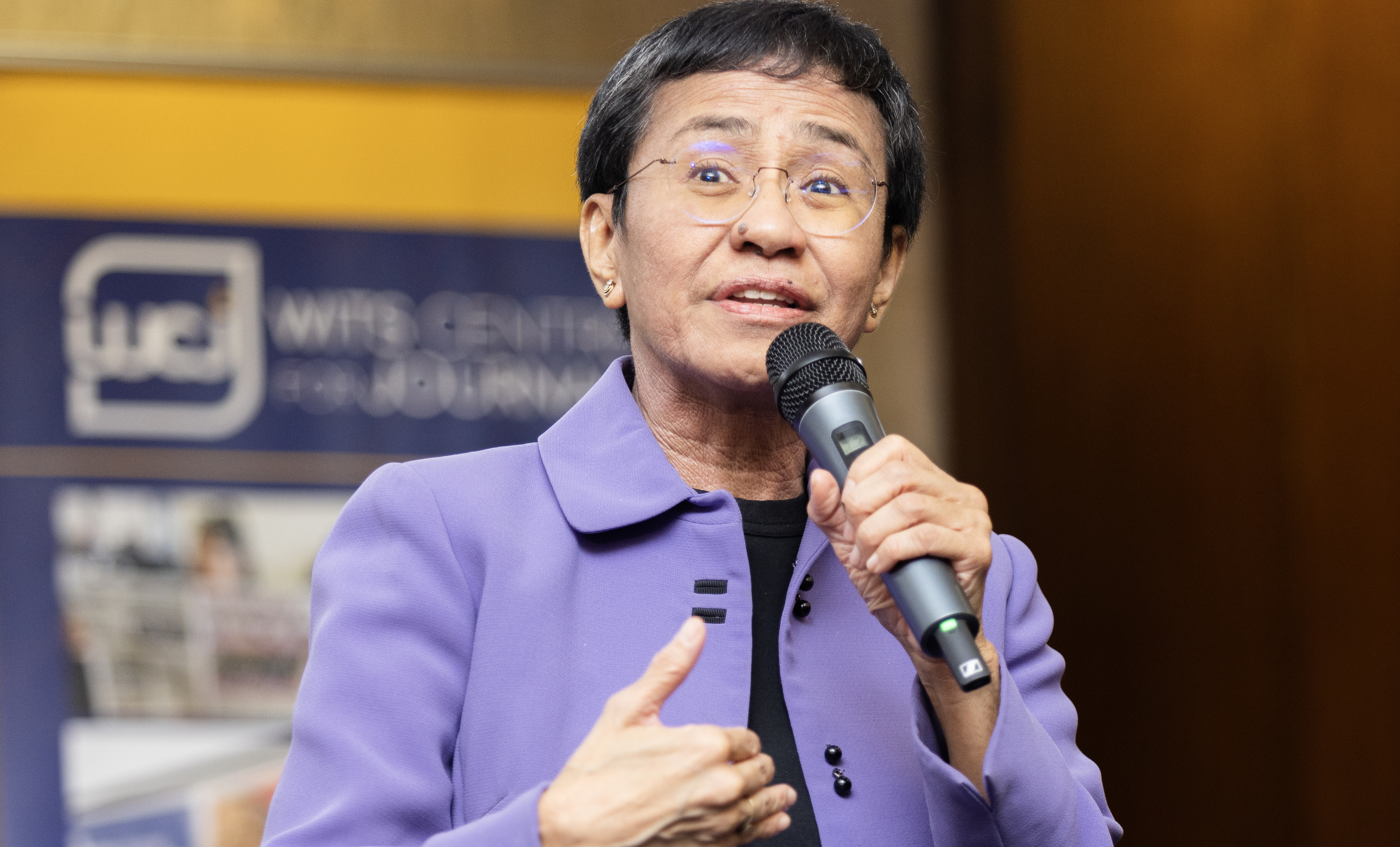‘Without facts, you can’t have truth. Without truth, you can’t have trust. Without these three, we don’t have a shared reality. We cannot begin to solve any problems, and we cannot have democracy,” said Maria Ressa, 2021 Nobel Peace Prize laureate, at a discussion at Wits University last week on big tech, authoritarianism and the reality of global disinformation.
The CEO and co-founder of Filipino news outlet Rappler argued that South Africa’s 29 May elections were successful, in part, due to the country’s relatively low social media penetration rate limiting the spread of disinformation.
When Daily Maverick followed up with Ressa at the 14th Desmond Tutu International Peace Lecture in Cape Town on 23 November, she said: “Technology, once seen as a great equaliser, is now a weapon wielded against the very foundations of democracy.”
Thandi Smith, head of programmes at Media Monitoring Africa (MMA), explained the threat further: “One of the biggest threats of disinformation is the impact it has on the ability to make informed decisions, decisions about your community and the world around you.”
Big tech’s leverage
While Ressa’s discussion at Wits was focused on how journalists could regain public trust in the face of increased global polarisation, an overall decrease in trust in the media, and big tech’s leverage over social media, a large part of the lecture focused on big tech’s role in the information landscape.
“Information warfare has shifted to the cellular level of democracy. What do I mean by that? Geopolitical power. Any corporation can go down to you, the micro target, so it becomes personal,” said Ressa.
Read more: Big tech giants play destructive and positive roles in news media industry
Independent and open-source information directory Datareportal put South Africa’s social media penetration at “42.8 % of the total population” as of January 2024 – lagging behind the global figure of “63.8% of the global population” as of October this year.
“As [South Africa’s percentage] increases, disinformation and information warfare, information operations, the breakdown of truth and trust will get worse,” said Ressa in Cape Town.
According to an investigation by Consumer Reports, Facebook, now Meta, is one of the global tech giants that collect hundreds of thousands of data points for each user from thousands of different sources.
According to Ressa, micro-targeted ad models used by social media giants create virtual clones of users, which are eventually sold to other companies and governments.
“Did you ever give your permission to be cloned?” she asked.
Profitable misinformation
According to a Freedom House report, the global decline of democracy began around 2006, which intersects with the advent of social media platforms like Twitter and Facebook.
Smith from MMA said, “Social media itself plays a role by not doing enough to disincentivise the spread of disinformation.”
“Content that goes viral is profitable and disinformation is, by design, content that can easily spread virally across social media platforms,” she said.
“Disinformation also erodes public trust in the very institutions that govern our democracy,” said Smith.
“This is not to say that these institutions should not be held accountable, but deliberate disinformation deepens the existing trust deficit in these institutions.”
According to Ressa, the effect of targeted ads, targeted messaging and the addictive nature of social media has “hacked our biology to change the way we feel because the way we feel changes [...] and changes the way we look at the world and how we vote”.
She noted that after Elon Musk, who will lead the US Department of Government Efficiency in president-elect Donald Trump’s administration, bought Twitter in 2022, it let go of 80% of its safety engineers.
“That brought them down to the sub-basement. And instead of Google and Facebook pulling him up, they came down with him. You voted with less protection. And [Google and Facebook] admitted off the record that why would they put all these safety measures in place? If Trump won, he’s vindictive, he would come after them.”
South Africa at risk
Tech giants like Google have come under fire in South Africa and abroad as their search engines are accused of anti-competitive behaviour.
According to Ressa, “Facebook literally choked traffic to news sites. The same is true for South Africa and the drop is anywhere from 50% to 85% referral traffic from Facebook.”
Regarding Google’s new generative AI feature, publications that opt to be absent from this functionally are filtered to the bottom of search results, further killing South Africa’s media space.
Read more: SA media companies turn to access to information law to hold tech giants to account
To contextualise the issue, in a survey by the Competition Commission's Media and Digital Platforms Market Inquiry, 77% of respondents that participated in the survey got their news from social media, with 18% finding it on search engines like Google, which already dominate the media space.
South Africa, like other democracies, is fertile ground for misinformation.
In the lead-up to the 2024 elections, misinformation spread like wildfire when the Zuma-led uMkhonto Wesizwe (MK) party accused the Independent Electoral Commission of South Africa of preemptively rigging votes in favour of the African National Congress.
Four days before the election, senior MK party member and daughter of Zuma, Duduzile Zuma-Sambudla, made posts on X alleging that the ANC had already started stealing votes in KwaZulu-Natal.
Other notable examples of social media campaigns spreading distorted or falsified facts included “the July 2021 riots in South Africa, Operation Dudula and the #putsouthafricansfirst narrative”, said Smith.
“Imagine when your social media penetration reaches 100% – the problem will be telling fact from fiction,” said Ressa.
“It’s like the show Stranger Things. You go into the ‘upside down’ which is deceptively familiar, but everything is grimy and full of sludge. I find that in South Africa, your traditional media is still very strong, but I don’t think it will last.” DM




